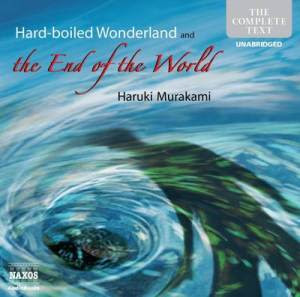 |
| Amazon |
 |
I was standing on a three-meter-square concrete platform jutting out over bottomless nothingness. No railing, no enclosure. Wish she'd told me about this, I huffed, just a tad upset. An aluminum ladder was propped against the side of the platform, offering a way down. I strapped the flashlight diagonally across my chest, and began my descent, one slippery rung at a time. The lower I got, the louder and more distinct the sound of water became. What was going on here? A closet in an office building with a river chasm at the bottom? And smack in the middle of Tokyo?"
After the jump, my review.
Grade: C+
The System. Calcutecs. The Factory. Semiotecs. INKlings. Data shuffling. Sound removal. Unicorns. Talking shadows. You should be able to tell by now we're dealing with science fantasy here. This 1985 novel is by Haruki Murakami. After reading Murakami's most excellent 2009 novel 1Q84, I sought other novels of his and found Hard-boiled Wonderland. 1Q84 was creatively quirky; this early novel, while still quirky, is formulaic.
The novel consists of interleaved chapters, half dealing with a younger technician who is drawn into a grandfatherly, folksy professor's information war. The technician is a trained expert at using his subconscious to encrypt data. The other half of the chapters deal with a pre-modern walled city where the residents all live contented lives lacking all ambition, joy or frustration, anger or love. The chapters eventually converge at "the end of the world," a concept with different meanings in each world.
I never bought into any of the story lines. The folksy scientist was all stereotype. The use of scientific-sounding jargon was ridiculously unconvincing. The mindless inhabitants of the walled city were dull and uninteresting. The grand struggle between the System and the Factory never went anywhere. Same with the story lines for the Semiotecs and INKlings. By the end, Hard-boiled Wonderland's main achievement was making me appreciate how much better a writer Murakami is now, twenty five years later, as shown in 1Q84.
An unexpected pleasure of Hard-boiled Wonderland is all of its references to Western culture: Bing Crosby, Duke Ellington, Bob Dylan, John Ford, Turgenev, Tolstoy, and numerous others. Murukami is Japanese. The novel is set in Tokyo. Still, the early Calcutec chapters have the feel of an American detective novel or film noir from the 1940s. This is not to imply that Hard-boiled Wonderland is derivative. It's not. Formulaic it is, but it's still uniquely Murakami.
Excerpt:
"To tell the truth, I do not know this thing called 'mind', what it does or how to use it. It is only a word I have heard."
"The mind is nothing you use," I say. "The mind is just there. It is like the wind. You simply feel its movements."

No comments:
Post a Comment